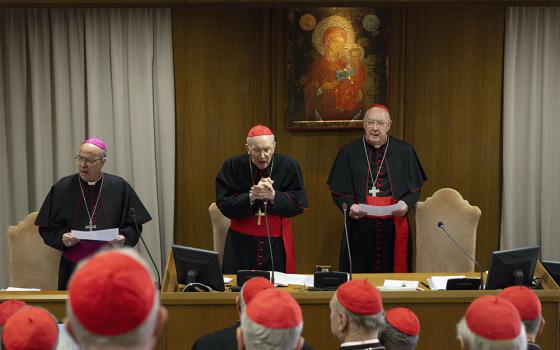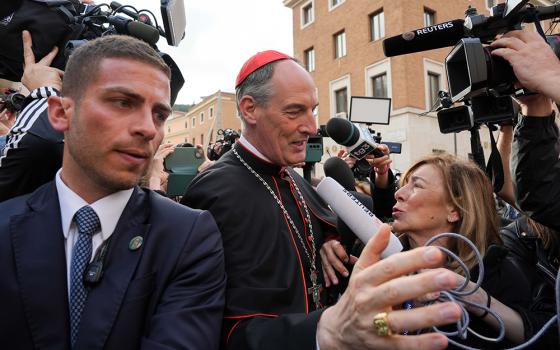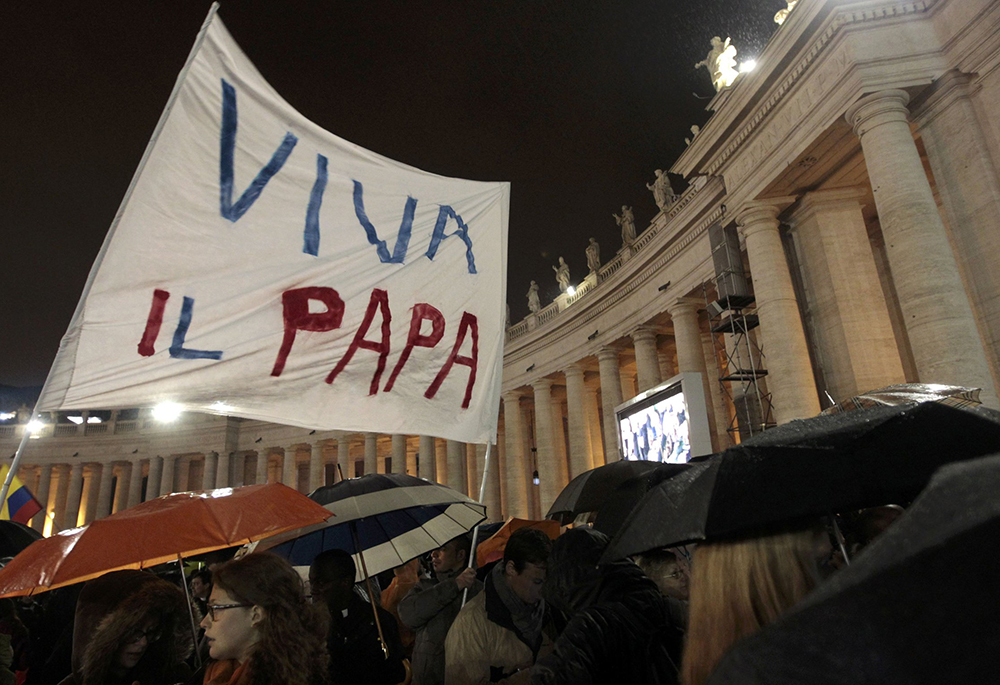
Pilgrims wave a banner saying "Viva il papa" ("Long live the pope") as white smoke rises from the chimney above the Sistine Chapel, indicating a new pope has been elected at the Vatican, in this photo from March 13, 2013. The conclave to elect a new pope met over two days before making a decision. (CNS/Reuters/Giampiero Sposito)
Around the world, and especially within the shadowed corridors of the Vatican, human forces will try to shape the outcome of the papal election. That is to be expected. Conclaves, for all their ritual and spiritual mystique, are still human affairs. Cardinals read the mood of the church. They form alliances. Some whisper. Some maneuver. Some conspire. Some retreat to pray.
The history of papal elections is filled with politics, strategy and intrigue.
None of this is new.
That's why Hollywood made a movie about a conclave.
However, we would be naive to imagine that the Holy Spirit is absent from the process, too fragile to endure the rough handling of human hands.
In the days ahead, we will hear predictions from every corner, including in the news pages of National Catholic Reporter. Who's gaining influence? Who's falling out of favor? Who is a theological liberal or conservative? Who is too old? Too young? Who has the right managerial experience, the necessary temperament, speaks the right languages, and comes from the essential part of the world?
Some of this analysis is helpful.
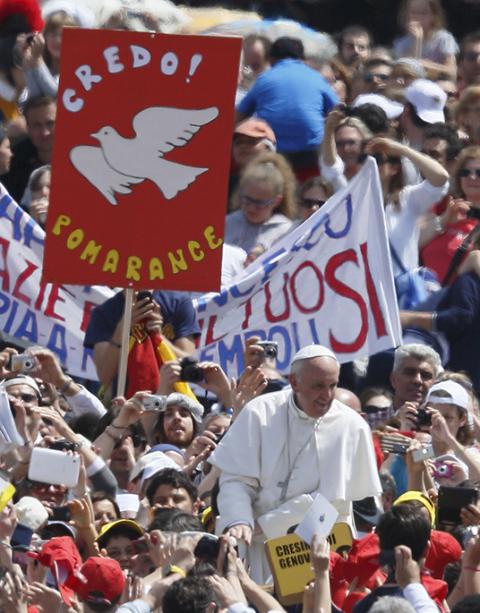
A sign with a dove symbolizing the Holy Spirit is seen as Pope Francis greets the crowd after celebrating a Mass in St. Peter's Square at the Vatican in this April 28, 2013, file photo. (CNS/Paul Haring)
All of it is incomplete.
Because the more profound truth — admittedly not always easy to accept and unhelpful to the bookmakers in Las Vegas — is that the Spirit tends to speak most clearly not when we grasp for control, but when we let go of it.
This is true in the life of the church, as it is in our own lives. We organize, plan and strategize — and yet life unfolds on its own mysterious terms. Wisdom across the ages tells us this plainly: Whether in the Psalms, the Tao Te Ching, among the desert fathers and mothers, or in the spiritual lives of saints and poets, surrender often opens the door to deeper understanding.
The Hebrew Scriptures tell us that wisdom begins with awe. Not with mastery. Not with control. But with standing in wonder. "Be still and know," the psalmist writes — not be efficient and accomplish.
In the Gospels, Jesus counsels a similar letting go: "Behold the lilies of the field and see how they grow! They toil not, they spin not." He urges trust in the unfolding of life, not as an escape from responsibility, but as an invitation to freedom from anxiety. This surrender is not passive. It is a more profound attentiveness to what is.
Advertisement
Letting go doesn't mean giving up hope. It means creating space. It means acknowledging that we don't see the whole picture. It means trusting that grace can work not only despite our efforts, but sometimes through them, and beyond them.
Yes, there will be politics in this conclave. There will be hopes and disappointments. There will be those pulling strings and those quietly sitting in prayer. But somewhere in the middle of it all, there may also be a whisper. Something unexpected. Something unaccounted for. Something no one could have planned.
After all, who could have predicted that a bespectacled Jesuit from Argentina stepping out onto that balcony in 2013, being introduced with the name Francis, saying, "Brothers and sisters, good evening," and gently bowing before the people?
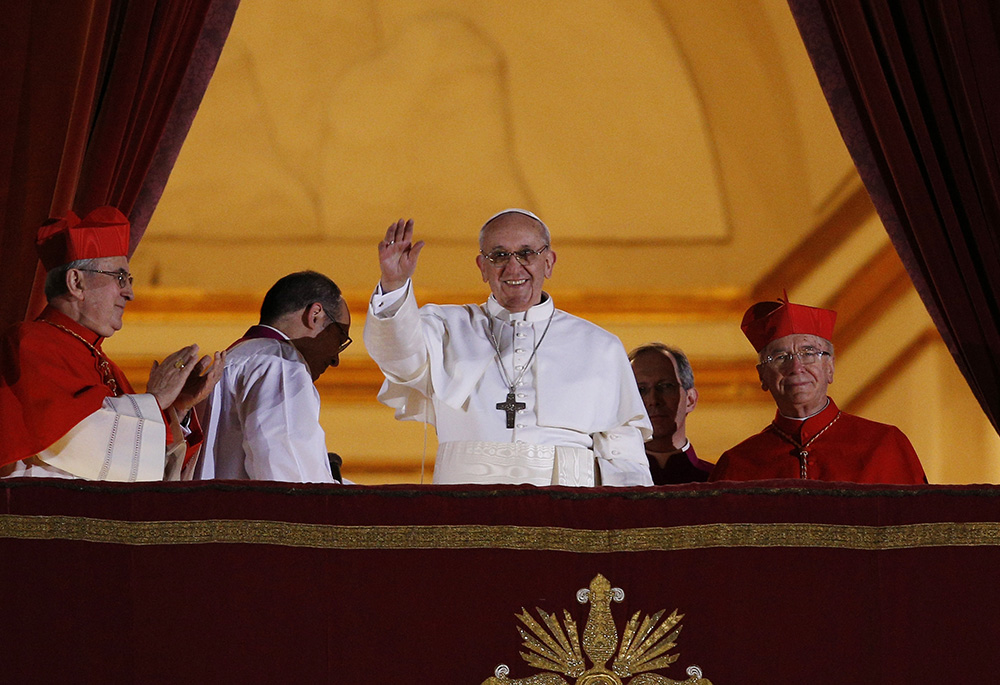
Pope Francis waves from the central balcony of St. Peter's Basilica following his election March 13, 2013. Pope Francis died April 21. (CNS/Paul Haring)
And look where that moment has led us: toward mercy, toward encounter, toward a Church more comfortable at the margins. Not a perfect church. Not the fully transformed church of our boldest visions. But one that, through Francis, has leaned more boldly into the Gospel.
That is how the Spirit often moves. The Spirit does not bypass history, but enters into it. Not by ignoring politics, but by swaying them through the hearts of those willing to listen.
There's a temptation in moments like this to grasp, to control, to declare: We know what the church needs. But perhaps a better starting point is humility. Possibly, like the lilies of the field or the early church gathered in confusion and wonder. We are asked to trust that something greater is unfolding — even now.
We do not know God's ways. But even in our doubts, we suspect that God — if such a presence is still alive in our world — moves us toward greater fullness. That is the faith we claim. That is the mystery we name as the Holy Spirit.
Let us follow this next conclave with curiosity, integrity, and yes, with hope. Not blind hope, but the kind that emerges when we stop trying to orchestrate the outcome and start paying attention to the quiet possibility that, once again, something sacred might surprise us.
We are asked to trust that something greater is unfolding — even now.





